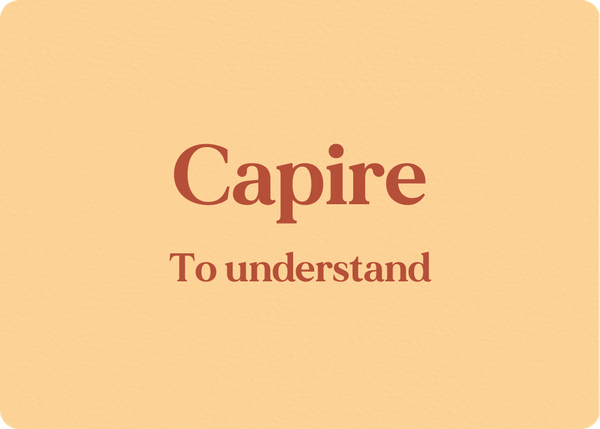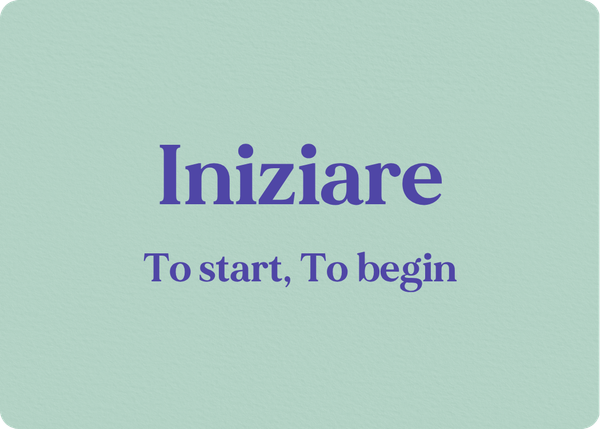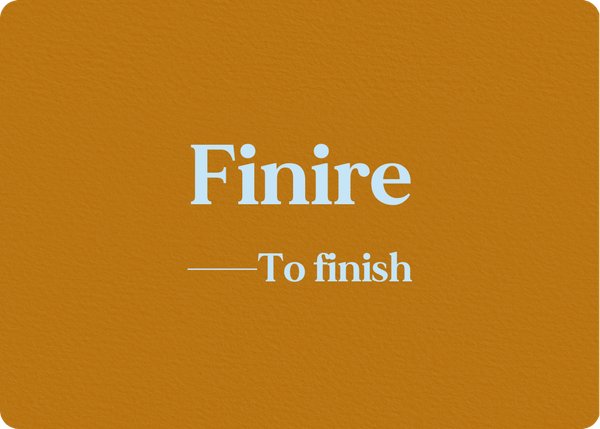What is Capire?
Capire is an Italian verb meaning "to understand", "to comprehend", or "to realize". It belongs to the third conjugation (-IRE verbs) and follows the pattern for -ISC- verbs, which add -isc- in certain forms. This verb is useful for expressing comprehension, understanding, and realization in Italian conversation and writing.
Key Features of Capire:
- Type: Regular third conjugation verb (-IRE) with -ISC- insertion
- Meaning: To understand, to comprehend, to realize, to grasp
- Special feature: Adds -isc- in certain forms of present indicative, present subjunctive, and imperative
- Auxiliary verb: Uses "avere" (to have) for conjugation in compound tenses
- Past participle: Capito
Indicativo – Indicative Mood
Presente (Present Tense)
| Person | Conjugation |
|---|---|
| io | capisco |
| tu | capisci |
| lui/lei | capisce |
| noi | capiamo |
| voi | capite |
| loro | capiscono |
Example:
Capisco meglio se mi fai un esempio.
I understand better if you give me an example.
Passato Prossimo (Present Perfect)
| Person | Conjugation |
|---|---|
| io | ho capito |
| tu | hai capito |
| lui/lei | ha capito |
| noi | abbiamo capito |
| voi | avete capito |
| loro | hanno capito |
Example:
Ho capito la storia solo dopo averla riletta con attenzione.
I understood the story only after rereading it carefully.
Imperfetto (Imperfect)
| Person | Conjugation |
|---|---|
| io | capivo |
| tu | capivi |
| lui/lei | capiva |
| noi | capivamo |
| voi | capivate |
| loro | capivano |
Example:
La mamma capiva sempre quando avevamo bisogno di aiuto.
Mom always understood when we needed help.
Trapassato Prossimo (Past Perfect)
| Person | Conjugation |
|---|---|
| io | avevo capito |
| tu | avevi capito |
| lui/lei | aveva capito |
| noi | avevamo capito |
| voi | avevate capito |
| loro | avevano capito |
Example:
Tu avevi già capito tutto prima che finisse la spiegazione.
You had already understood everything before the explanation was finished.
Passato Remoto (Simple Past)
| Person | Conjugation |
|---|---|
| io | capii |
| tu | capisti |
| lui/lei | capì |
| noi | capimmo |
| voi | capiste |
| loro | capirono |
Example:
Quel giorno capì di aver trovato la persona giusta.
That day he understood he had found the right person.
Trapassato Remoto (Past Anterior)
| Person | Conjugation |
|---|---|
| io | ebbi capito |
| tu | avesti capito |
| lui/lei | ebbe capito |
| noi | avemmo capito |
| voi | aveste capito |
| loro | ebbero capito |
Example:
Dopo che ebbe capito l'errore, si scusò immediatamente.
After he had understood the mistake, he apologized immediately.
Futuro Semplice (Simple Future)
| Person | Conjugation |
|---|---|
| io | capirò |
| tu | capirai |
| lui/lei | capirà |
| noi | capiremo |
| voi | capirete |
| loro | capiranno |
Example:
Presto capirete perché abbiamo preso questa decisione.
Soon you will understand why we made this decision.
Futuro Anteriore (Future Perfect)
| Person | Conjugation |
|---|---|
| io | avrò capito |
| tu | avrai capito |
| lui/lei | avrà capito |
| noi | avremo capito |
| voi | avrete capito |
| loro | avranno capito |
Example:
Quando avranno capito le regole, parteciperanno al gioco.
Once they’ve understood the rules, they’ll join the game.
Congiuntivo – Subjunctive Mood
Presente (Present Subjunctive)
| Person | Conjugation |
|---|---|
| che io | capisca |
| che tu | capisca |
| che lui/lei | capisca |
| che noi | capiamo |
| che voi | capiate |
| che loro | capiscano |
Example:
Spero che tu capisca le mie intenzioni.
I hope that you understand my intentions.
Passato (Past Subjunctive)
| Person | Conjugation |
|---|---|
| che io | abbia capito |
| che tu | abbia capito |
| che lui/lei | abbia capito |
| che noi | abbiamo capito |
| che voi | abbiate capito |
| che loro | abbiano capito |
Example:
Mi auguro che abbiate capito la lezione.
I hope that you have understood the lesson.
Imperfetto (Imperfect Subjunctive)
| Person | Conjugation |
|---|---|
| che io | capissi |
| che tu | capissi |
| che lui/lei | capisse |
| che noi | capissimo |
| che voi | capiste |
| che loro | capissero |
Example:
Pensavo che tu capissi il francese.
I thought you understood French.
Trapassato (Past Perfect Subjunctive)
| Person | Conjugation |
|---|---|
| che io | avessi capito |
| che tu | avessi capito |
| che lui/lei | avesse capito |
| che noi | avessimo capito |
| che voi | aveste capito |
| che loro | avessero capito |
Example:
Se avessi capito prima, avrei agito diversamente.
If I had understood earlier, I would have acted differently.
Condizionale – Conditional Mood
Presente (Present Conditional)
| Person | Conjugation |
|---|---|
| io | capirei |
| tu | capiresti |
| lui/lei | capirebbe |
| noi | capiremmo |
| voi | capireste |
| loro | capirebbero |
Example:
Capiresti il mio punto di vista se fossi nei miei panni.
You would understand my point of view if you were in my shoes.
Passato (Past Conditional)
| Person | Conjugation |
|---|---|
| io | avrei capito |
| tu | avresti capito |
| lui/lei | avrebbe capito |
| noi | avremmo capito |
| voi | avreste capito |
| loro | avrebbero capito |
Example:
Senza i sottotitoli non avremmo capito il film.
Without the subtitles we would not have understood the film.
Imperativo (Imperative)
| Person | Conjugation |
|---|---|
| (tu) | capisci |
| (lui/lei) | capisca |
| (noi) | capiamo |
| (voi) | capite |
| (loro) | capiscano |
Example:
Capisci bene quello che ti sto dicendo!
Understand well what I'm telling you!
Indefinite Moods
Infinito (Infinitive)
- Presente (Present): capire (to understand)
- Passato (Past): avere capito (to have understood)
Examples:
È difficile capire questa teoria.
It's difficult to understand this theory.
Mi dispiace di non aver(e) capito prima la situazione.
I’m sorry I didn’t understand the situation earlier.
Participio (Participle)
- Passato (Past): capito (understood)
Example:
Il concetto capito ieri mi è molto utile oggi.
The concept understood yesterday is very useful to me today.
Gerundio (Gerund)
- Presente (Present): capendo (understanding)
- Passato (Past): avendo capito (having understood)
Examples:
Capendo il problema, possiamo trovare una soluzione.
By understanding the problem, we can find a solution.
Avendo capito che era inutile insistere, ho lasciato perdere.
Once I realized it was pointless to insist, I let it go.
The verb Capire at a glance: Key tenses you need
| Present | Present Perfect | Imperfect | Present Subjunctive | Imperfect Subjunctive | Present Conditional |
|---|---|---|---|---|---|
| io capisco | io ho capito | io capivo | che io capisca | che io capissi | io capirei |
| tu capisci | tu hai capito | tu capivi | che tu capisca | che tu capissi | tu capiresti |
| lui/lei capisce | lui/lei ha capito | lui/lei capiva | che lui/lei capisca | che lui/lei capisse | lui/lei capirebbe |
| noi capiamo | noi abbiamo capito | noi capivamo | che noi capiamo | che noi capissimo | noi capiremmo |
| voi capite | voi avete capito | voi capivate | che voi capiate | che voi capiste | voi capireste |
| loro capiscono | loro hanno capito | loro capivano | che loro capiscano | che loro capissero | loro capirebbero |
Conclusion
Mastering the conjugation of "capire" is essential for expressing understanding, comprehension, and realization in Italian. This regular third conjugation verb with -ISC- insertion follows a predictable pattern.
Remember the key points:
- Uses "avere" as auxiliary verb in compound tenses
- Regular -IRE verb with -ISC- insertion pattern in certain persons of present indicative, present subjunctive, and imperative
- Past participle is "capito"
- Essential for expressing understanding, comprehension, and mental processes
Keep practicing with real sentences and contextual examples to master this Italian verb!





